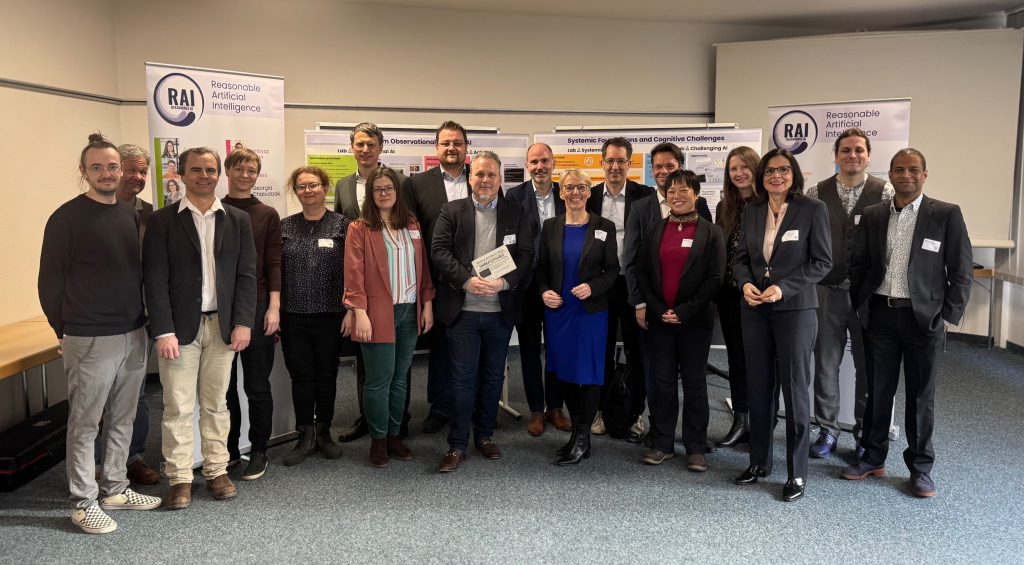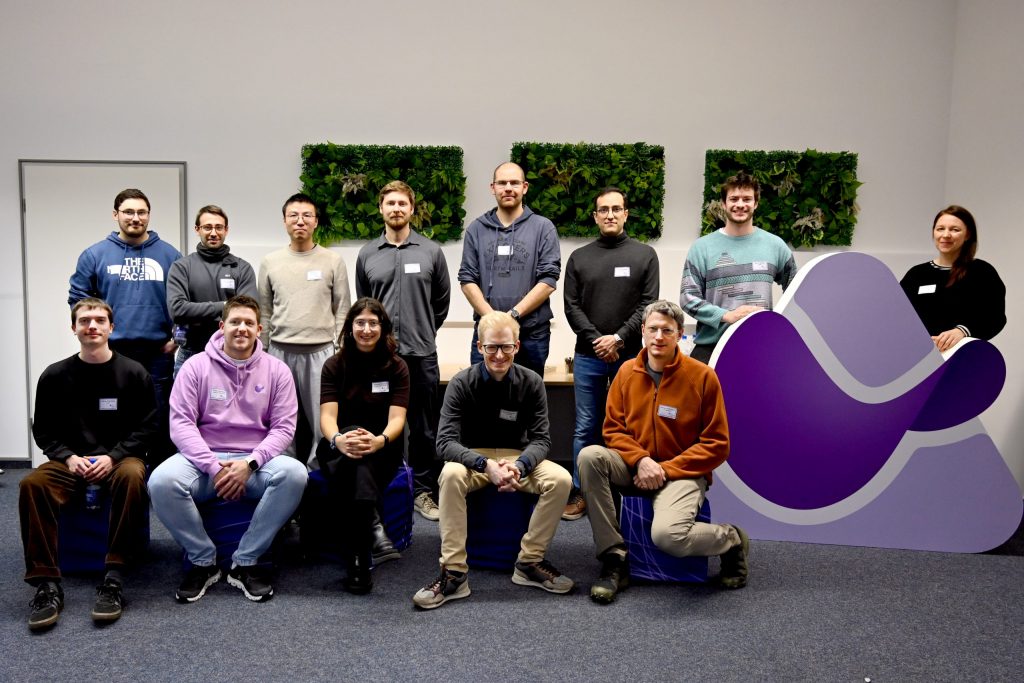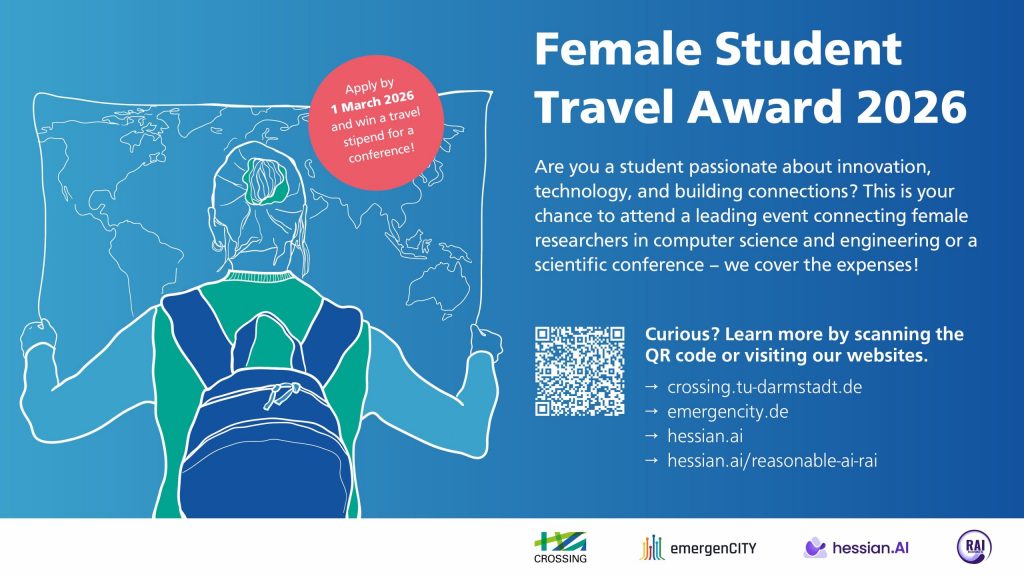
Reasonable and safe: The future of artificial intelligence
The “Reasonable Artificial Intelligence” project receives funding as a Cluster of Excellence
The researchers in the new Cluster of Excellence “Reasonable Artificial Intelligence” (RAI) , which is headed by TU Darmstadt with participation by hessian.AI, are carrying out research into a new generation of artificial intelligence that can learn in “more reasonable” ways. The project was selected for funding in a multi-stage competition within the Excellence Strategy from the German federal and state governments. This coveted funding once again acknowledges the outstanding research and long-standing expertise in the field of artificial intelligence for which TU Darmstadt has been renowned for many years.
Although deep learning (DL) has enabled important advances in the field of artificial intelligence (AI) over the last ten years, current AI systems have displayed some significant weaknesses, such as an inability to reason, difficulty handling new situations and a need for continuous adjustments. Last but not least, current AI systems also require substantial resources. Therefore, the new Reasonable Artificial Intelligence (RAI) Cluster of Excellence aims to develop the next generation of reasonable AI.
This next generation of AI systems will learn using a “reasonable” amount of resources, a “reasonable” quality of data and in accordance with “reasonable” data protection standards. It will be capable of working with a healthy dose of common sense, possess the ability to handle new situations and contexts and be based on reasonable training paradigms that will enable continuous improvement, interaction and adaptation.
“Despite impressive advances, current AI systems have demonstrated some significant weaknesses”, explains Mira Mezini, who is a professor of computer science at TU Darmstadt, a spokesperson for RAI and Co-Director of the Hessian Center for Artificial Intelligence (hessian.AI). “Although applications such as ChatGPT can write comprehensive texts on complex subjects, they lack the ability to apply common sense. They are often incapable of understanding multi-layered interrelationships and also require huge amounts of resources. Developing a truly reasonable AI, which minimises risks and works efficiently, still remains a challenge and is something we are addressing with ‘Reasonable AI’ and hessian.AI”.
“We are convinced that RAI will shape the future of AI in Germany and around the world”, adds Marcus Rohrbach, who is a professor of computer science at TU Darmstadt and another spokesperson for the Cluster of Excellence. “New, efficient speech models, such as the recently launched DeepSeek, have demonstrated how quickly and efficiently advances in AI development can be achieved. These models not only open up technological opportunities and possibilities to conserve resources but also highlight the need to develop trustworthy and reasonable AI. Europe has a unique opportunity here to take on a pioneering role by combining innovations with ethical standards, efficiency and transparency.”
The RAI project covers four research areas:
1. Systemic AI: This area focusses on the development of software and system methods that will enable RAI systems to be trained efficiently and support their integration into existing systems.
2. Observational AI: This research area focusses on contextual learning and brings together different AI concepts to provide RAI with a good level of common sense.
3. Active AI: This area focusses on continual and adaptive lifelong learning with active exploration so that RAI systems are able to adapt better.
4. Challenging AI: This research area develops measurement and evaluation methods (benchmarks) that can be used to evaluate and improve the performance of RAI systems.
“I would like to express our sincere thanks for being selected as a Cluster of Excellence not just in my name but also on behalf of my colleagues. We are absolutely delighted that our RAI project has been considered forward-looking research and included in the Excellence Strategy from the German federal and state governments”, says Kristian Kersting, who is also a spokesperson for the RAI cluster project, a professor of computer science at TU Darmstadt and Co-Director of hessian.AI. “In a world in which technological dependencies are increasingly fuelling geopolitical tension, the development of a sovereign European artificial intelligence is of vital importance. Europe must be able to set its own standards and develop independent, trustworthy technologies so that it can remain resilient both economically and socially. This is where ‘Reasonable AI’ will play a role by developing the next generation of reasonable AI.”
RAI is coordinated by TU Darmstadt. Another participant is hessian.AI – an institution jointly developed by 13 universities that is also coordinated by TU Darmstadt. hessian.AI carries out excellent basic research into AI, provides powerful AI computer infrastructure and associated services and promotes start-ups and innovation.
Researchers at the Julius Maximilian University Würzburg, Goethe University Frankfurt am Main, the University of Tübingen, the University of Saarland and the University of Bremen are also participating in the project.
About the excellence strategy of the ferderal and state government
To further strengthen the international competitiveness of research at German universities, the federal and state governments have established the Excellence Strategy as a funding programme. The key objective of the Excellence Strategy is to strengthen top-level research in areas that are internationally competitive, to institutionally strengthen German universities, and to advance the development of the German higher education system.
To this end, the Excellence Strategy comprises two separate but intertwined funding lines. The “Clusters of Excellence” funding line, coordinated by the German Research Foundation (Deutsche Forschungsgemeinschaft – DFG) provides project-based funding for internationally competitive research areas at German universities. The “Universities of Excellence” funding line, coordinated by the German Science and Humanities Council (Wissenschaftsrat – WR), is designed to fund institutional strategies that promise to strengthen universities as a whole and create outstanding framework conditions for excellent research.


